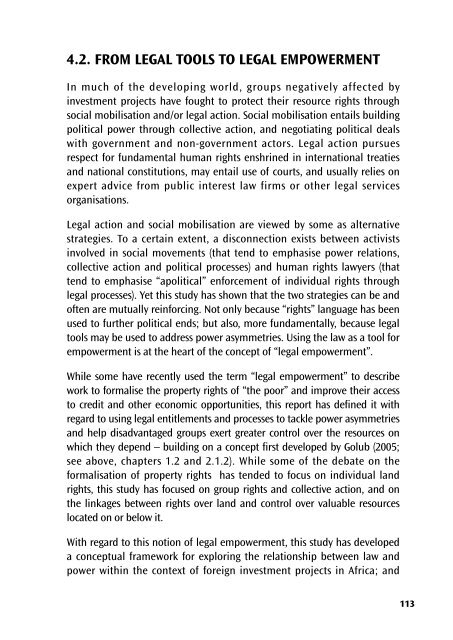Legal empowerment for local resource control
Legal empowerment for local resource control
Legal empowerment for local resource control
You also want an ePaper? Increase the reach of your titles
YUMPU automatically turns print PDFs into web optimized ePapers that Google loves.
4.2. FROM LEGAL TOOLS TO LEGAL EMPOWERMENT<br />
In much of the developing world, groups negatively affected by<br />
investment projects have fought to protect their <strong>resource</strong> rights through<br />
social mobilisation and/or legal action. Social mobilisation entails building<br />
political power through collective action, and negotiating political deals<br />
with government and non-government actors. <strong>Legal</strong> action pursues<br />
respect <strong>for</strong> fundamental human rights enshrined in international treaties<br />
and national constitutions, may entail use of courts, and usually relies on<br />
expert advice from public interest law firms or other legal services<br />
organisations.<br />
<strong>Legal</strong> action and social mobilisation are viewed by some as alternative<br />
strategies. To a certain extent, a disconnection exists between activists<br />
involved in social movements (that tend to emphasise power relations,<br />
collective action and political processes) and human rights lawyers (that<br />
tend to emphasise “apolitical” en<strong>for</strong>cement of individual rights through<br />
legal processes). Yet this study has shown that the two strategies can be and<br />
often are mutually rein<strong>for</strong>cing. Not only because “rights” language has been<br />
used to further political ends; but also, more fundamentally, because legal<br />
tools may be used to address power asymmetries. Using the law as a tool <strong>for</strong><br />
<strong>empowerment</strong> is at the heart of the concept of “legal <strong>empowerment</strong>”.<br />
While some have recently used the term “legal <strong>empowerment</strong>” to describe<br />
work to <strong>for</strong>malise the property rights of “the poor” and improve their access<br />
to credit and other economic opportunities, this report has defined it with<br />
regard to using legal entitlements and processes to tackle power asymmetries<br />
and help disadvantaged groups exert greater <strong>control</strong> over the <strong>resource</strong>s on<br />
which they depend – building on a concept first developed by Golub (2005;<br />
see above, chapters 1.2 and 2.1.2). While some of the debate on the<br />
<strong>for</strong>malisation of property rights has tended to focus on individual land<br />
rights, this study has focused on group rights and collective action, and on<br />
the linkages between rights over land and <strong>control</strong> over valuable <strong>resource</strong>s<br />
located on or below it.<br />
With regard to this notion of legal <strong>empowerment</strong>, this study has developed<br />
a conceptual framework <strong>for</strong> exploring the relationship between law and<br />
power within the context of <strong>for</strong>eign investment projects in Africa; and<br />
113

















